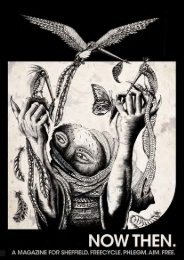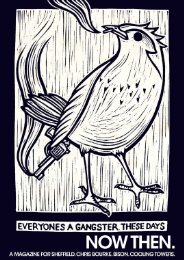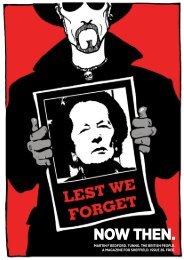Download - Now Then
Download - Now Then
Download - Now Then
Create successful ePaper yourself
Turn your PDF publications into a flip-book with our unique Google optimized e-Paper software.
Making<br />
Notes.<br />
The Brixton Pound.<br />
Ian Cracknell.<br />
nickdeakin.com<br />
PAGE 6.<br />
In September 2009, Brixton hit the national headlines with the news<br />
that it was to launch its own local currency, the Brixton Pound (B£).<br />
In discussing the story with a friend, I told her that I thought this was<br />
a brilliant thing - a vehicle for independent business to invest in itself,<br />
enabling like-minded individuals to put their money where their mouths<br />
are in direct support of local trade, keeping their hard-earned within the<br />
local economy. To my disbelief, my friend disagreed. She didn’t think it<br />
would work. It was idealistic. It was unrealistic. In summary, she didn’t think<br />
it was a good idea. I vowed to return to the issue a year later, as I had not<br />
just every hope for the project’s success, but every belief that this was a<br />
worthwhile, workable idea to strengthen independent trade within the<br />
community. I really wanted my friend to be wrong about this.<br />
Of equal value to your regular pound sterling, the B£ isn’t designed to<br />
replace our national currency, but to complement it, working to retain the<br />
diversity of traders on Brixton’s high street and markets. It isn’t the only<br />
local currency in the UK - there is the Totnes Pound in Devon, the Lewes<br />
Pound in Sussex and the Stroud Pound in Gloucestershire. These local<br />
currencies seem to be part of a growing global zeitgeist of supporting<br />
local independent trade and betterment of the environment by supplying<br />
consumer needs locally. The B£ was set up by a group of volunteers from<br />
Transition Town Brixton, a community-led organisation which is part of an<br />
international umbrella movement for action on energy issues and climate<br />
change.<br />
Local currencies are not a new thing. They’ve been in existence since the<br />
Middle Ages, and for centuries they were the only kind of money there<br />
was until European countries developed their own national currencies. But<br />
despite the concept’s long history, the project raises difficult questions. The<br />
B£ can’t be banked, so with both interest and lending removed from the<br />
financial circuit, isn’t the currency redundant for true investment in business<br />
and the local economy? As our financial transactions become increasingly<br />
paperless, doesn’t the future of a paper-only currency look doubtful?<br />
The former is a definite sticking point, and one that has already caused<br />
some businesses to opt out of the scheme, having found the process of<br />
exchanging the notes to be a hassle. But maybe that’s the key – instead<br />
of exchanging them, maybe they should be spending them on supplies<br />
from their fellow B£ trading stores. A potential answer to the second<br />
problem could also counteract the negative side-effect of the first, because<br />
Transition Town Brixton is currently working on a digital platform for mobile<br />
phones, potentially removing paper from the equation.<br />
So how do you measure the success of such a project? How about<br />
expansion? One year on, over 170 shops, restaurants, cafes and market<br />
traders in Brixton now accept the B£. There’s very little you can’t buy with<br />
the currency, from food, electronic goods, hardware and garden products<br />
to the services of pharmacists, drycleaners, solicitors and even architects.<br />
As an additional incentive, shoppers also receive selected discounts and<br />
special offers when making purchases with the B£. Even the local council,<br />
Lambeth, is working to enable people to pay their bills with the currency.<br />
How about the increased media profile for Brixton? Lambeth Council has<br />
estimated the value of the project’s national publicity campaign to be<br />
£10,000. The benefit to the shops is obvious - all participating businesses<br />
receive free advertising, marketing and publicity just by agreeing to take<br />
part in the scheme. There are a few places on the list that I’d like to make<br />
a point of visiting next time I’m in London, particularly The Bureau of Silly<br />
Ideas, where one can apparently indulge in theatre, pie-throwing and<br />
making robots. I mean, who wouldn’t want to support that?<br />
I still believe the Brixton Pound is a good thing and I’m happy to confirm<br />
that it continues to enjoy every success. It has succeeded in promoting<br />
an idea to the nation: that we can take greater control of the financial<br />
mechanisms within our communities, for the benefit of our much-loved<br />
independent shops and businesses, our relationship with them as<br />
consumers, our investment in the local economy and our impact on the<br />
environment. Sheffield Pound, anyone?<br />
brixtonpound.org / transitionnetwork.org<br />
PAGE 7.












